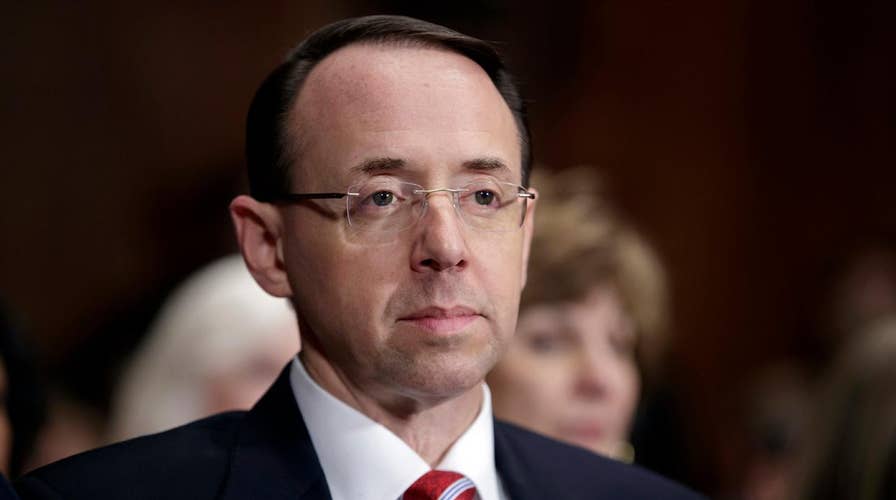Who is Rod Rosenstein and why did he go after Comey?
Vice President Pence said the decision to fire the former FBI chief was based on the deputy attorney general's recommendation who has worked for both Republican and Democratic administrations; Catherine Herridge goes in-depth for 'Special Report'
A little more than two weeks ago, Senate Minority Leader Chuck Schumer called incoming Deputy Attorney General Rod Rosenstein someone “who is independent, who would stand up for the law.” Schumer said just last weekend he was a “fair man” and “excellent” prosecutor.
By Wednesday, that characterization of Rosenstein – who was confirmed to his current position by a 94-6 Senate vote – was dead.
“Serious doubts have been cast on Mr. Rosenstein’s impartiality,” said Schumer, D-N.Y., in the aftermath of President Trump’s decision to sack FBI Director James Comey, due in part to a memo Rosenstein wrote.
Rosenstein, a longtime federal prosecutor with a sterling reputation, is now at the center of immense speculation, pressure and finger-pointing in Washington where the level of political toxicity could hardly push higher.
The low-profile Rosenstein was thrust onto the national stage with a single memo, a three-page May 9 document castigating Comey over his handling of the investigation into Hillary Clinton’s secret email server. That memo was cited by the Trump administration as the primary basis for firing Comey on Tuesday evening.
The narrative now pushed by Democrats is: the memo was mere pretext for Trump to oust the FBI boss digging into his campaign's Russia ties.
It's an unfamiliar position, at the center of the storm, for Rosenstein.
The Washington Post reported Wednesday night that the newly confirmed deputy AG threatened to resign after reports began painting him as the primary “mover of the decision” to sack Comey.
White House Deputy Press Secretary Sarah Huckabee Sanders on Thursday morning, however, said she was “not aware of his threatening to resign.”
Rosenstein later told reporters he did not threaten to quit and did not intend to quit his post.
Regardless of Rosenstein's personal reaction to the attention, Democrats increasingly are calling on him to name a special prosecutor.
Sen. Dianne Feinstein, D-Calif., put out a statement Thursday saying she's "more troubled" by his memo each time she reads it, likening it to a "political document."
"The memo appears to have been hastily assembled to justify a preordained outcome," she said. “The attorney general and deputy attorney general should recuse themselves from the appointment, selection and reporting of a special counsel. This issue should be handled by the most senior career attorney at the Justice Department.”
Meanwhile, Schumer’s 180-degree turn from Rosenstein backer to detractor was representative of the linguistic gymnastics numerous Democrats have employed to oppose a man they once, nearly universally, said they respected.
“He's been a person who has called it the way it should be,” Sen. Ben Cardin, D-Md., told MSNBC on Sunday. “He has not been partisan.”
Yet on Tuesday, Cardin was signaling Rosenstein’s continuing oversight of the FBI wouldn’t be good enough, and he joined Democratic calls for an independent prosecutor to pick up where Comey left off in his probe of alleged Russian meddling in the U.S. election and possible ties between Trump associates and Russian officials.
“This latest action has now added more questions upon questions,” Cardin wrote in a Facebook post.
It’s under some debate if Rosenstein, whom Comey reported to directly, wrote the missive of his own accord or was instructed to do so by a senior Trump administration official. The White House suggests the memo was all him.
“Rod Rosenstein apparently got to the Department of Justice 16 days ago or so and did a fresh analysis, and these were his conclusions,” counselor to the president Kellyanne Conway told “Fox & Friends” on Thursday.
Further looking to push Rosenstein into a corner, The New York Times editorial board published an “Open Letter to the Deputy Attorney General” on Thursday telling Rosenstein that he was “deeply implicated” in the “shocking decision” to fire Comey, and that Trump “exploited the integrity you have earned over nearly three decades in public service, spending down your credibility as selfishly as he had spent other people’s money throughout his business career.” The Times board said that since Rosenstein wrote the memo laying out Comey’s alleged sins, his ability to oversee any Russia investigation was “compromised” and his only choice was to appoint a special counsel.
But while anonymous sources, senior aides and newspaper editorial boards have all spoken out over Rosenstein’s actions and what lies ahead of him, the one person yet to go on the record is Rosenstein himself.
That could soon change.
Feinstein called Wednesday for Rosenstein to brief members of the Judiciary Committee on the “reasons and the timing of the firing, as well as what steps are being taken to ensure this action will have no impact on the work of the FBI on the ongoing investigation.”
Fox News' Jake Gibson contributed to this report.





